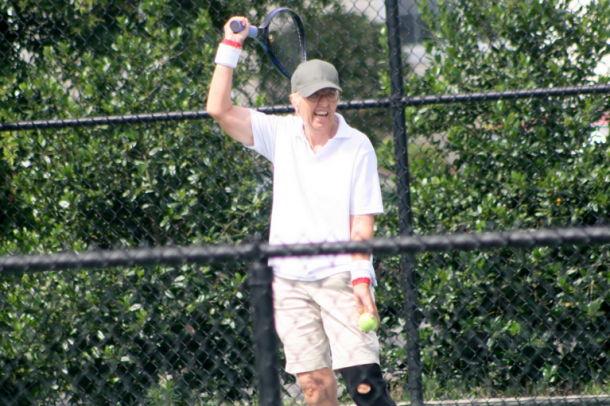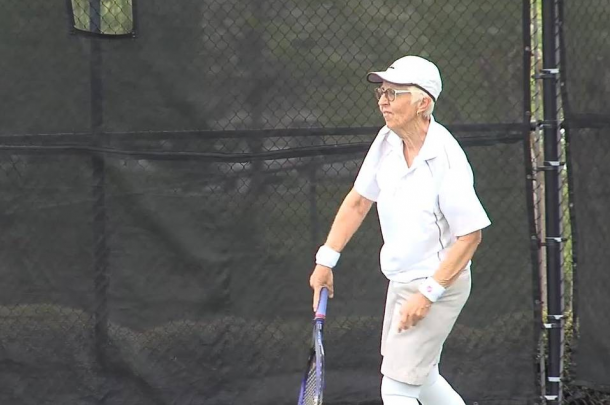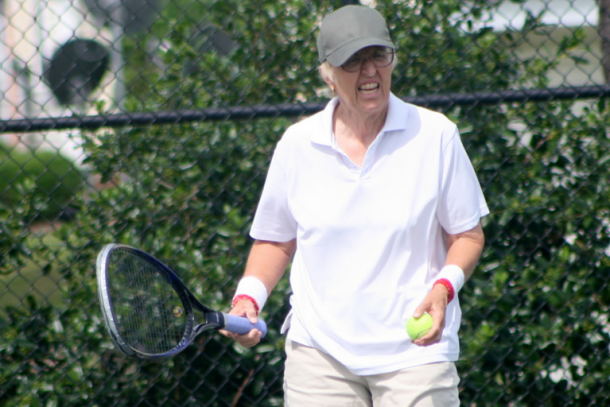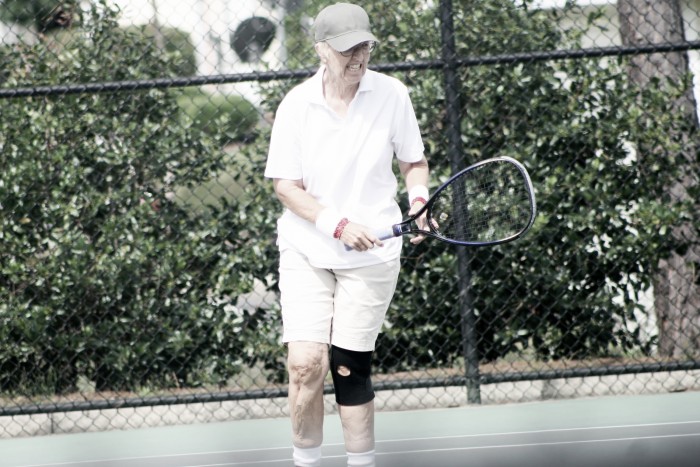It was a mild and quiet Sunday at the Pelham Racquet Club in Pelham, Alabama that seemingly redefined what is possible in professional tennis. A $25,000 stop on the ITF Pro Circuit, the Legacy Credit Union Women's $25,000 Pro Circuit Challenger plays host to one of the few professional tournaments played on green clay, a slightly faster version of the traditional European red clay.
While walking along the grounds of this pristine 20-clay court establishment, one might expect to see budding tennis players—most of them in their twenties and some in their late teens—grinding away on the green clay in an attempt to win precious ranking points, which can further elevate their ranking and gain them entry into higher-level events. Though this was the scene during the majority of first round qualifying matches, there was one match that stood out; one match won by a remarkable woman.
But this woman is no ordinary tennis player. She doesn’t have a coach, nor does she have a physiotherapist and agent following her around from tournament-to-tournament. She can’t hit very hard nor can she run very fast, but she tries to make up for it with her unique forehand slice and the occasional underhand serve – which poses more of a problem for opponents than one could ever imagine. But who is this woman? One might ask.

Meet Gail Falkenberg, a 69-year-old woman who recently broke a 32-match losing streak by winning her first professional tennis match since 1998.
Last Sunday, Falkenberg took to the court to play Rosalyn Small, a 22-year-old American. With the odds seemingly stacked against her, Falkenberg unexpectedly cruised to victory, utilizing her variety to devastating effect. “Winning on the pro circuit again was a main goal so I enjoyed every minute of it,” she said in an exclusive interview with VAVEL USA. “Ms. Small had trouble handling all my sidespin and backspin and underhanded serve.”
As a result of her first round victory in the qualifying draw, the 69-year-old faced off against top seed and 20-year-old Taylor Townsend, a former junior world number one. Unfortunately, Falkenberg’s quest for a second successive win was quickly washed away by Townsend, who mercilessly rolled past an opponent 49 years her senior in 36 minutes, without the loss of a single game.
“With Taylor I was disappointed not to win a game,” Falkenberg said. “I had one game point on my serve. Her serve was overpowering, hitting spots each side. But I always evaluate matches and work on ways to improve my game. I see playing Taylor as a great opportunity to meet that goal.”
Up until this point in time, Falkenberg’s story is nothing short of remarkable. For starters, she’s self-taught, which explains the uniqueness of her forehand slice. Born in New Jersey, tennis was never a popular sport in The Garden State, and sports for women in her junior years were not organized. At first, Falkenberg took up the sport of tennis as a form of exercise after working in audio-visual production for major corporations, and for the federal government for 15 years. But, she started taking it more seriously as a walk-on at UCLA where she played number 6 singles on the university’s very first tennis team in the 1960’s. In addition to her love for tennis, she also played women’s basketball, and even admitted to being better at it in the Wall Street Journal.
“Just to exercise I got back into tennis and somehow won a national championship in Women’s Open Singles at the National Public Parks Championships, Springfield, Missouri in 1983,” she recounted.
However, at the age of 38, Falkenberg decided to try competing professionally and even got as high as number 343 in the world, with her most notable victory coming at the 1988 Australian Open, where she won a round of qualifying. To put that into perspective, Steffi Graf would go on to win her first Australian Open that year, which was just her second Grand Slam title. Graf now stands with 22, second to Margaret Court for the most major singles titles in history.
Unfortunately, she would go on to fall a round later, but it’s a vivid memory that the 69-year-old still cherishes to this day. She once played future three-time Grand Slam champion Jennifer Capriati, who was still in her early teenage years at the time, and lost in straight sets.
“I played Jennifer Capriati around that time frame in Orlando at a pre-qualifying event for Amelia Island,” recounted Falkenberg. “She had just won the national 18's and beat me 7-6, 6-4. I had beaten the top [Nick] Bollettieri Academy gal in 3 sets earlier that morning so I was a bit tired. But that day was probably my best ever in tennis—about 7 hours of singles.”

But as the old saying goes, “All good things must come to an end,” and Falkenberg’s dream had suddenly met reality shortly thereafter.
“I expended my funds on the tour so I got a job coaching the men and women tennis teams at the University of Central Florida from 1991-1999, winning coach of the year in the TAAC Conference for the women,” she said. “I still played and recruited at tour tournaments off and on to keep my world ranking on the books. I burned out from college coaching and moved to Las Vegas to teach tennis at several clubs.”
“In 2003, my mother had a major stroke and was bedridden. I gave up tennis and cared for her until she died in 2010. Then I picked it up again the end of 2011 and here we are back in Florida, retired and playing competitive tennis again.”
At this point, one might think, “How in the world would a 69-year-old be allowed to play a tournament where she is three times as old as the majority of the players in the field?” Well, the answer is a lot more straightforward than one might expect.
Falkenberg actually hasn’t been on many losing streaks. In fact, she only had a losing streak on the pro circuit up until her unprecedented victory last weekend. “I win state tournaments ranking me at number seven in Florida,” she explained. “I won a round in the national open qualifying sectional event against a tour player in three sets. That gave me a national top 500 ranking of number 329 [and 12 ranking points].”

At 69 years of age, the New Jersey native’s achievements are nothing short of admirable, but there is always the obvious questions: Why doesn’t she choose to play in tournaments for players her age? Though she would be able to give herself a more realistic chance of winning consistently, Falkenberg says her game style has always worked well against the younger generation, and she enjoys playing at a high level because it keeps her young at heart. “I play for the love of the game,” she added. “Tennis is truly a sport of a lifetime.”
It is fair to say that sporting fans, and even players alike, don’t hear about stories—like that of Gail Falkenberg—very often. Though opinions may differ in regards to whether or not players of a certain age group should be able to compete professionally, Falkenberg says most of her peers have been quite respectful, even if she gets the occasional strange look. “I am told by Keri Wong, a tour USA player, that the kids call me ‘The Legend’ just for playing at that level,” she said. “That’s an honour.”
Going forward, the 69-year-old—who is less than nine months away from her 70th birthday—has very clear intentions. “I want to keep playing as long as my body holds out,” she stated. “My goals are to win two matches in a row, improve my game, and win in my 70’s.”
With the determination she has shown in the face of adversity, there is no reason why Gail Falkenberg cannot continue to strive for excellence in an attempt to attain all three goals in the near future, and that is exactly what she’ll be aiming to do in the coming years.










































